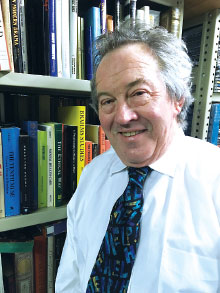Symposium to Address Self-Disclosure of Mental Illness, Burnout Symptoms
Abstract
The goal of the session is to characterize the rationale, risks, and potential benefits of psychiatrists disclosing to others their own journeys with mental illness and psychiatric treatment.
Is it helpful to tell others that you, a psychiatrist, have a mental illness? Should you disclose only to psychiatrists or perhaps to others, such as residents, students, and peer professionals?

Steven Moffic, M.D., says the issue of self-disclosure overlaps with development of measures to reduce physician burnout.
And what about patients? When is it helpful for patients to know more about a therapist, and is it ever helpful for them to know that you have a mental illness, had psychiatric treatment, been in therapy, or used medications?
Those are some questions that a panel of psychiatrists will address in the session “Psychiatrists’ Views on Self-Disclosure of Mental Illness: Symposium Data on When, Why, and How to Disclose” at APA’s 2019 Annual Meeting.
The session will be chaired by Robert Marin, M.D., associate director of the Center for Public Service Psychiatry at the University of Pittsburgh. Speakers include Claire MaChere Cohen, M.D., Michelle Georges, M.D., Steven Moffic, M.D., and Raymond Reyes, M.D.
“The session is intended for all meeting attendees, not just those who have mental illness,” said Marin. “All of us are affected directly and indirectly by the systemic meanings of mental illness. The complexities of stigma and self-disclosure may call on us to respond appropriately when others make mention of their mental health challenges.”
Moffic said the program has further relevance to psychiatry because measures to reduce burnout and improve physician well-being depend on psychiatrists’ willingness to disclose their symptoms and functional problems. Moffic has spoken about his own experience with burnout, and a video of his sharing it is posted on APA’s webpage on psychiatrist wellness and burnout.
“When I retired in 2012 from my main source of employment, I was feeling overly frustrated and believed there was nothing I could do to make it better,” he told Psychiatric News. “A colleague told me I was burned out. I didn’t really know what it was at the time, but I felt better psychologically almost immediately.”
(Moffic is also a presenter at the session “Cultural Issues in Administrative Psychiatry” and will be speaking about Islamophobia and Muslim mental health. Also speaking at the session is APA President Altha Stewart, M.D.)
“A lot of research shows that it’s the systems we work in that disempower physicians from doing what we think we can do to help patients,” Moffic said. “Not only does the epidemic of physician burnout worsen our own mental health, but it reduces the overall quality of care of our patients. It may be important, therefore, for the public to know of this problem and advocate for system improvements.”
Marin agreed. “The issue of self-disclosure intersects with the development of policies and practices that promote wellness among psychiatrists and other physicians,” he said.
Marin said decisions about self-disclosure—when and to whom—are always a matter of discretion and depend on the circumstance. This is especially so when it comes to disclosing to patients—it runs counter to traditional notions about the anonymity of the therapist. “In some situations, there are other considerations than anonymity, and there may be a place for authenticity and openness,” he said.
Marin said the overall goal of the self-disclosure session is to characterize the rationale, risks, and potential benefits of psychiatrists disclosing to others their own journeys with mental illness and psychiatric treatment. Speakers will introduce the program by summarizing the evaluation data from the 2018 Annual Meeting symposium on self-disclosure.
In narrative and small group interactions, participants will describe their own journeys with mental illness and experience with self-disclosure. The program will conclude with open discussion based on the presentations and small group discussions. Participants will be invited to make recommendations for further discussion, research, and system change.
“We want to create a welcoming environment and a sense of community conducive to dialogue,” Marin said. ■
“Psychiatrists’ Views on Self-Disclosure of Mental Illness: Symposium Data on When, Why, and How to Disclose” will be held Wednesday, May 22, from 8 a.m. to 9:30 a.m. Moffic’s video can be viewed here.



